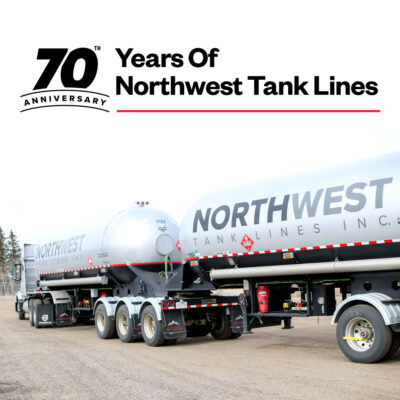CALGARY, Alta. – What’s better than the Good Housekeeping Seal of Approval? If you’re a company involved in the chemical industry, it could be Responsible Care-In-Place Verification, a way to help ensure safety and efficiency in handling what could be extremely dangerous substances.
A set of stringent health, safety, environmental, security, and community outreach standards designed and monitored by the Canadian Chemical Producers’ Association (CCPA), the Responsible Care-In-Place standard could be thought of as similar to the ISO standards, but taken to the next level.
And while maintaining such standards may seem like a no-brainer considering the potential for human life loss and environmental damage that could result from an emergency involving chemicals, only two Canadian trucking companies have qualified for recognition under the program so far: Northwest Tank Lines and Harmac Transportation.
According to Michael Perry, a Victoria-based management consultant who works with and speaks for Northwest Tank Lines, it’s part of “the cradle-to-grave mentality of handling chemicals responsibly in Canada, to take charge from the input side of the manufacturing process to the eventual delivery of the product to the end user.”
Since most chemical companies don’t own transportation companies, Perry says, the transportation link of the chain was out of their control and the Responsible Care-In-Place Verification process is meant as a way to correct that situation.
Perry says the concept really took off after the infamous Bhopal, India, disaster in 1984, in which methyl isocyanate (MIC) gas leaked from a tank at a Union Carbide plant, killing approximately 3,800 people and injuring several thousand others, according to the Madhya Pradesh state government as quoted by Union Carbide on its www.bhopal.com Web site.
“After that,” Perry says, “chemical companies got together and decided to clearly take responsibility of the process from start to finish, including disposal of any residual chemical products.”
Perry says this extends, in Northwest Tank Lines’ case, right to washing out tanks of chemicals the company hauled. “You can’t just go and wash it out into a creek,” he says. “It has to go into a contained site and be handled properly according to the rules. This business is federally-regulated too, so there are rules you have to follow.”
The Responsible Care-In-Place standard goes above and beyond the regulatory and legal requirements, however, and Perry says the chemical companies have bought into it completely. “It’s a theme of sustainability,” he says.
It took Northwest, which celebrates 55 years in business in 2010, three years to get verified as a Responsible Care-In-Place partner, an exhaustive process in which the CCPA sends out a quartet of auditors, two of whom are from the community itself and two who are professional consultants.
“They talked to suppliers, customers, drivers and staff,” says Perry, “and got a real feel as to whether Northwest was actually practicing the stringent Responsible Care-In-Place standards.”
Perry says that if the auditors find any items that are “real show stoppers,” areas where the company has serious work to do before its house is considered to be in order, it’s given a certain amount of time to correct them, after which the auditors take another look to verify the requirements have been met. In Northwest’s case, Perry says, there were only some minor items that needed work and “those were all done within the prescribed time frame and therefore the verification was done.”
Northwest’s audit was completed in the fall of 2008 and official recognition as a verified Responsible Care-In-Place transportation partner was given at the CCPA’s Western Leadership group meeting in February, 2009.
That doesn’t end the process, though. “There’s an ongoing system in place to check on whether companies are adhering to the CCPA’s expectations,” Perry says, including the requirement for Northwest’s president to sign off annually on a report that the company is still meeting the Responsible Care-In-Place requirements. An official audit is also required every three years.
What separates the Responsible Care-In-Place standards from ISO, Perry says, is that a company is only required to map out its processes with ISO, but there’s no real verification -whereas with Responsible Care-In-Place they’ve added the confirmation process. The criteria cover health and safety (occupational and operations), environmental concerns, security and Transportation Community Awareness and Emergency Response (TransCAER).
Perry claims Northwest is one of the leaders in TransCAER community outreach activities, attending several events each year with emergency first responders such as fire, EMS and police “to raise awareness and preparedness in transporting chemicals,” he says, noting that Northwest president Tom Blaney was the recipient of the first-ever CCPA/TransCAER President’s Award for Leadership and Continuous Improvement in Transportation Safety.
The TransCAER events include simulated chemical spills to give the participants a chance to practice what they’ll need to do if there ever is an incident. Northwest also has a contract with Quantum Environmental to help out in any emergency.
Such attention to detail makes a good marketing tool for Northwest and any other company that goes through the Responsible Care-In-Place audit process successfully, and Perry says Northwest uses that to its advantage when he conducts independent annual customer interviews for the company.
“I always ask them if they’re aware of Northwest’s commitment to responsible care and TransCAER,” he says, “and they all are because it’s just part of the culture, the DNA of Northwest. And they can see the benefits, the professionalism of the drivers, the quality of the equipment.”
As part of its commitment, Northwest also hired a full-time health, safety and environment director and an additional safety manager, as well as installing satellite tracking in all the units so there’s always a connection between the drivers and dispatch. It has also added electronic stability to its equipment so that, for example, if a unit heads into a corner too quickly the stability system overrides the driver, decreasing the engine power and/or applying the brakes.
Perry says Northwest has also installed audible back-up alarms on all its signature black and silver units.
“It’s that sort of thing that the customers are aware of and appreciate,” Perry says.
It’s also the kind of thing that could allow Northwest to charge a premium for its services, if it weren’t for current economics and the ongoing challenge to successfully market the benefits of a Responsible Care Partnership.
Still, even though the current business climate means Northwest can’t really charge a premium, Perry notes “it gives a lot of customers a sense of security knowing that they don’t have to worry about the product being hauled from Point A to Point B.”
Perry also says Northwest’s customers notice and appreciate its regular company newsletters -called Spirit -which it publishes twice a year. “Customers typically like reading about Northwest’s ongoing commitment to safety and learning about their people and equipment,” he says.
While qualifying for -and maintaining -the Responsible Care-In-Place standard is a major commitment and a major expense, Perry says it gives the company a competitive advantage.
And with a better economy and increased customer awareness of Responsible Care, such an advantage could be a benefit to a company’s bottom line as well.



